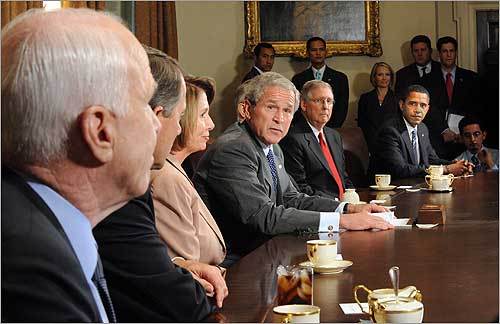The fiscal cliff debate is a reprise of the TARP debate of late 2008, with the Republicans under pressure to do “something” to stave off economic collapse. This time, the threat is about a crisis that may be about to happen, rather than one that has just happened. But the game is the same. Just as Republicans were once asked to drop their principles to bail out Wall Street, now they are being asked to do the same to bail out government.
Republicans should learn from the mistake they made in TARP. Instead of giving in to short-term hysteria about saving the economy, they should ask what kind of economy they are being asked to save–a state-centered economy that cannot grow fast enough to create jobs and prosperity, or a market-centered economy that creates the most opportunities for all.
It is worth short-term shock to the former to preserve the latter.
TARP, or the Troubled Asset Relief Program, was more a symbolic gesture to calm the markets rather than a real and immediate solution. Half of the money was not even spent until President Barack Obama took office nearly three months after the bill’s passage in October 2008. Much of it was mis-spent to reward Wall Street cronies; the head of the FDIC, Sheila Bair, now says that TARP was not necessary in the first place.
The House of Representatives agreed initially, with small-government conservatives joining anti-Wall Street Democrats to defeat the bill. It only passed on a second try, with threats that rejection would cause markets to crash. Sen. John McCain had suspended his campaign to rush to Washington, D.C. to support the bailout; as a result, he blurred key differences with Obama on the size and power of government, and lost the election.
Now Republicans are being asked to blur those boundaries once again, and agree to Democrats’ demand that they raise tax rates on the top earners–a policy that Obama himself once resisted, but which he has now made his top priority. Instead of talking about the real problem, which is runaway spending, Washington is negotiating about “revenues”–and Republicans are being asked to sign onto Democrats’ profligate policy.
If they fail, we are told, America will go over the “fiscal cliff” of tax hikes and spending cuts–and it will all be Republicans’ fault, according to Democrats and the media, though Democrats controlled Congress from 2007 to 2011, and enacted the highest deficits in U.S. history, leading to the present crisis. In 2008, Republicans were instructed to yield on spending; now, in the sequel, they are being told to drop their resistance to taxes.
There is almost no discussion on the Democratic side about entitlement reform, or the unsustainable cost of wasteful government programs, or the problems caused by the dramatic expansion of the welfare state. Just as Democrats bore little of the blame for the bailouts of 2008–Obama campaigned, in fact, on his support for the auto bailout–they are bearing none of the burden for the fiscal cliff or the broader debt and deficits.
TARP helped give rise to the Tea Party movement, which began as a backlash against both political parties, and organized in earnest after President Obama passed the giant $862 billion stimulus in early 2009 (after campaigning on a pledge to provide a mere $50 billion). Democrats paid the price–by losing the House of Representatives–as did establishment Republicans who lost their seats to Tea Party challengers in primaries.
Though the Tea Party lost some ground in the 2012 elections–chiefly through the re-election of President Obama, but also by key losses in the House–it remains strong, and will punish Republicans who vote to raise tax rates.
Democrats have re-launched an Alinsky-style campaign of personal attacks against Grover Norquist. But his no-tax pledge is powerful because it is hugely popular, not because of his individual power.
The larger question is whether Republicans have the courage to fight for the principles of individual freedom and opportunity that built the prosperity Democrats seek to exploit for their ideological purposes.
McCain said in 2008 that he thought he was doing what was best for the economy. But his party’s principles are better for the economy than TARP, and are worth suffering temporary political–and economic–shocks to achieve.

COMMENTS
Please let us know if you're having issues with commenting.